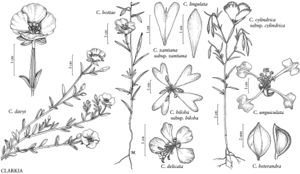Clarkia davyi
Madroño 12: 33. 1953.
Stems prostrate or decumbent, to 90 cm, sparsely puberulent. Leaves: sessile or subsessile; blade oblanceolate to broadly elliptic or obovate, 1–2.5 cm, apex usually obtuse. Inflorescences open racemes, axis straight; buds erect. Flowers: floral tube 2–5 mm; sepals reflexed in pairs or individually; corolla bowl-shaped, petals lavender-pink shading white or pale yellow basally, unspotted, 5–11 mm; stamens 8, subequal; ovary 8-grooved; stigma not exserted beyond anthers. Capsules 15–25 mm. Seeds brown or gray, 1 mm, scaly, crest inconspicuous. 2n = 34.
Phenology: Flowering Apr–Jun.
Habitat: Grasslands, low sea bluffs.
Elevation: 0–100 m.
Discussion
Clarkia davyi is ecologically restricted, mainly growing along the Pacific coast on bluffs and grassy stabilized sand dunes, rarely farther inland. Its range extends from Humboldt and (barely) Del Norte counties in the north through all coastal counties to Santa Barbara County in the south, including Santa Rosa Island.
Clarkia davyi is morphologically similar to the polytypic South American tetraploid C. tenella and appears to be one of the parental species of the hexaploid C. prostrata.
Selected References
None.
